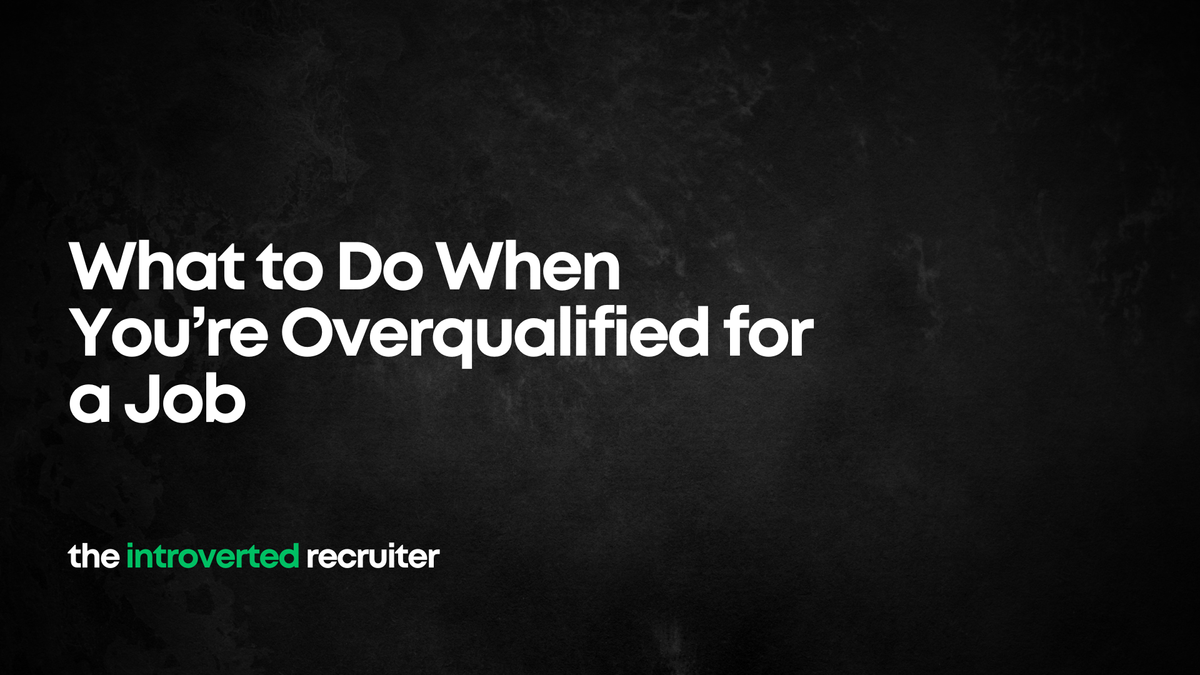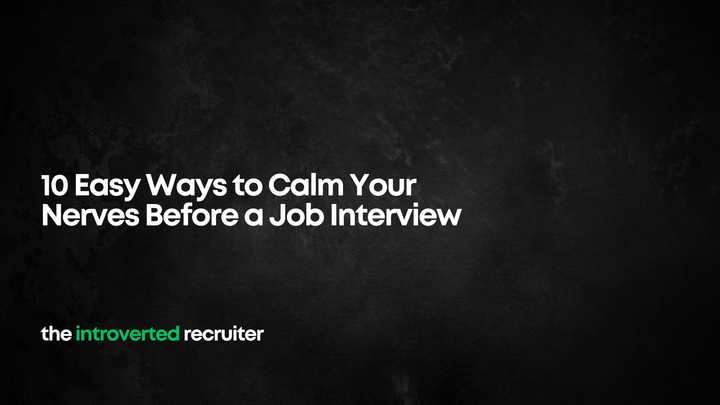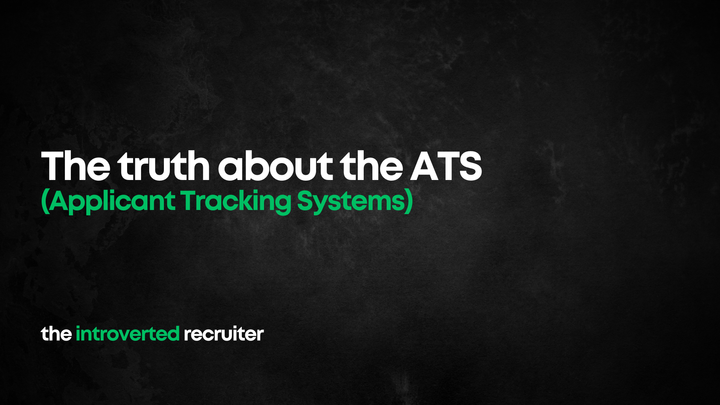What to Do When You’re Overqualified for a Job

Hearing “You’re overqualified” after you’ve put effort into a job application feels a bit like a polite brush-off.
But being overqualified doesn’t mean you’re the wrong person for the job—far from it. With the right approach, you can turn what looks like a potential setback into a strategic advantage.
Here’s how to reframe your experience, target your applications, and address the overqualification question head-on in interviews to increase your chances of landing the role you want.
The Overqualification Perception: What’s Really Behind It?
First things first, let’s tackle the perception of overqualification. Hiring managers can be wary of applicants with extensive experience because they worry you might:
- Get bored and leave after a short period, costing the company time and money in rehiring.
- Want more money than they’re able to offer, or expect rapid promotions.
- Have trouble fitting into a team where your level of expertise is higher than the role requires.
While these are valid concerns, they’re not always accurate. If this is a role that genuinely aligns with your goals right now—whether it’s about pivoting industries, balancing work with life priorities, or simply finding a company with a great culture—you can address each of these concerns proactively in your application and during the interview.
1. Frame Your Experience as Relevant, Not Excessive
The first step is rethinking how you present your experience. Rather than focusing on the length or depth of your career, highlight how your expertise makes you the ideal fit for the specific challenges of this role. Use your CV and cover letter to position yourself as an asset, not an overachiever who’s aiming too low.
Here’s how to do it:
- Emphasise Transferable Skills: Focus on skills that are directly applicable to the role rather than listing out everything you’ve done in your career. Pick examples from your past roles that align closely with the responsibilities of the job you’re applying for.
- Tailor Your CV: This is crucial. Strip back details that aren’t immediately relevant to the job. If you’re applying for a hands-on role, cut back on language that might come across as high-level, like “strategy” or “executive.” You want your CV to reflect that you’re ready to get your hands dirty and dive into the day-to-day, not sit in a corner office.
- Showcase a Learning Mindset: Mention ways in which you’ve stayed curious and engaged with new challenges throughout your career. This shows you’re not just seeking a “step-down” job but are genuinely interested in the role for the growth and experience it offers.
2. Be Clear About Why You Want This Role
If you’re overqualified, hiring managers might assume you’re applying as a stop-gap until something better comes along. To counter this, it’s essential to give a clear, authentic reason why you want this specific job at this specific company.
You could be looking to:
- Pivot into a new industry and learn from the ground up.
- Rediscover work-life balance after a period in demanding, senior roles.
- Focus on a skill you enjoy but haven’t used recently.
- Join a company with a mission or values that align closely with your own.
Being upfront about your “why” shows you’ve thought this through and are genuinely interested in the role for reasons beyond just a steady paycheck. It makes it easier for hiring managers to understand that you’re not a flight risk.
3. Address Overqualification Directly in A Cover Letter
Your cover letter is a great place to tackle the overqualification concern right from the start. Acknowledge your experience level and reframe it as a strength. For example:
“With a strong background in project management and team leadership, I’m excited to bring my skills to [Company Name] in this role, where I can focus on [specific aspects of the role that appeal to you, like problem-solving, collaboration, or creative strategy]. I’m particularly drawn to this position because it offers the chance to [mention an opportunity for growth or a connection to your career goals].”
Use language that indicates a commitment to the role and the team. This way, the hiring manager knows you’re aware of your experience level and see it as an advantage rather than a mismatch.
4. Navigating the Overqualification Conversation in an Interview
Once you get to the interview stage, the overqualification question might come up directly. When it does, use it as a chance to highlight your interest and reassure the interviewer of your intentions. Here are a few ways to respond effectively:
- Emphasise Your Motivation for the Role: Be open about why this role is right for you now, reinforcing that it aligns with your current goals. Something like, “At this point in my career, I’m looking for work that lets me have a more hands-on impact, which is exactly what this role offers.”
- Show Enthusiasm for Learning: Explain how this position will allow you to develop new skills or explore an area of your field in more depth. Hiring managers want to know that you’ll stay engaged. Try: “While I have a lot of experience in [related area], I’m excited about the chance to work more closely on [specific skill or task] in this role.”
- Address Longevity: If the hiring manager seems concerned you won’t stick around, reassure them with statements that demonstrate your commitment. A response like, “I’m looking to commit to a role where I can bring real value over the long term,” can help ease concerns about turnover.
5. Showcase Adaptability and Teamwork
One of the biggest misconceptions about overqualified candidates is that they may struggle to fit into a role or team where they aren’t the most senior. To counter this, make sure you demonstrate your adaptability and collaborative nature.
- Share Examples of Past Adaptability: If you’ve taken on diverse roles or shifted responsibilities in the past, mention this. Talk about how you’ve adapted to various team structures and been successful in a range of environments.
- Highlight Your Mentorship Abilities: If applicable, you can even position your experience as a benefit to the team. Share your willingness to support and mentor colleagues if that aligns with the team’s goals. But be careful with this one—don’t come across as someone who thinks they’ll be taking over!
6. Have a Long-Term Plan
Finally, it’s helpful to outline a vision for your future that incorporates this role. If you see this position as a stepping stone within the company, mention that. If it’s about maintaining a specific work-life balance or developing expertise in a particular area, be honest about that too. When hiring managers understand that you’ve given real thought to how this role fits into your larger plan, they’ll be less likely to see your experience as a mismatch.
Wrapping Up: Turn Overqualification into Opportunity
Overqualification doesn’t have to be a barrier. By reframing your experience, tailoring your application, and addressing potential concerns directly, you can make yourself the obvious choice—even if you’re more experienced than the job demands. Embrace your background and let it work to your advantage, showing the hiring manager that you’re ready to bring genuine value and commitment to their team. Remember, with the right approach, overqualification can be a stepping stone, not a stumbling block.
If you’re facing the overqualification hurdle, this is a chance to turn it into a strength.
Sign Up For My Newsletter
Sign up for my free newsletter on SubStack for all the latest content straight into your inbox as well as a free Job Search Guide & CV Template.
Follow Me
Find me on LinkedIn , TikTok , YouTube or Instagram where I share lot’s of practical no nonsense advice.



